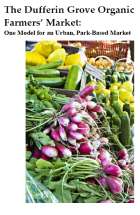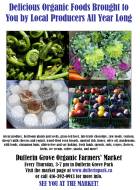
Pages in this Folder:

Related Folders:
See also Department Site Map
Publications:
Market-related videos
Comments?
For the basics, see
- Website & Privacy Policies
- How To Get Involved
- The Role of the Park
Search options:
Department Site Map
Custodians:
posted on April 25, 2011
Agriculture and the Election: Questions from the Organic Council of Ontario
Future of Farming in Canada:
1. How does your party’s platform address the shrinking number and
growing size of farms in Canada?
2. Canada doesn’t have a national food policy. Is a National Food
Policy a priority for your party?
3. Protecting farmland from development pressures has never been more
important than today… what steps will your party take to both protect
farmland and the ability for people to farm that land?
4. ON farmers have had to contend with free and open trade with the US
without the benefit of a US-style Farm Bill for support. It leaves
Ontario farmers at the mercy of the subsidized competition to the
South. Does your party support either a) creating a similar Farm Bill
or b) challenging the US Farm Bill at the WTO?
Climate Change:
1. It has been suggested that “real”, economically viable farms must
be at least $250,000 in sales annually- yet many organic farms are
more profitable with smaller gross income than that- what approaches
to agriculture are supported by your party’s platform?
2. Organic agriculture provides 30-50% greater water retention in
soil, reduces on-farm energy use between 20-60%, does not rely on
synthetic fertilizers, pesticides, or herbicides. What would your
party do to support greater adoption of organic farming as a climate
change mitigation strategy?
3. Seeds are a big issue for agriculture. Our pride and joy
internationally is Canola- bred through public research dollars.
Traditional seed breeding in the face of climate change is ever more
important. Today, we have no national seed bank, and our traditional
breeding programs have been gutted in favour of funding trans-gene
research. Do you support increasing public investment in a seed bank
and in seed stock development?
Organic Regulation:
1. Canada adopted our Organic Standards in 2009- yet today we have no
secure funding for maintenance and upkeep of this federal standard,
nor any funding for the work of the committees that do the
interpretation work. Without funding, our internationally recognized
standard is at risk: what would your party do to ensure long term,
stable funding for maintenance and upkeep of our hard won organic
standards?
2. While we’ve had an organic standard nationally since 2009, there
has been no promotional or educational campaign from the federal
government to promote the logo or educate Canadians on what the logo
means. Would your party invest in this promotion?
GMOs:
1. When the election was called, the Standing Committee on Agriculture
was about to vote on a GE Alfalfa moratorium: what is your party’s
position on a GE Alfalfa Moratorium?
2. Depending on the study, between 75 and 85% of Canadians want GMO
foods labeled: what is your party’s position on GMO labeling and why?
3. Organic farming techniques are increasingly being adopted or, more
rightly, returned to the broader farming landscape. Would your party
support permanent funding for public research on organic agricultural
techniques?
Farm and Food Infrastructure:
1. Local food is not a trend: it is a shift, says Sandy Houston of the
Metcalf Foundation. Yet to have local food year round, Canada needs to
heavily invest in and update our processing sector, as well as our
post-harvest handling and storage infrastructure. What is your party`s
policy on supporting investment in food processing?
2. Abattoirs are closing in Ontario at an alarming rate. The
regulations in place favour consolidation, not diversity, in
processing. Yet these regulations did not prevent the Maple Leaf
deaths . Other jurisdictions have regulations for micro and small
scale processing that is scale appropriate. What is your party’s
position on appropriate regulations for local, sustainably produced
processed food?
posted on April 20, 2011
Organic Farmers Sue, Seek Protection From Monsanto
By:' Carey Gillam
Published: 30-Mar-11
Source: ReutersA consortium of U.S. organic farmers and seed dealers filed suit against global seed giant Monsanto Co. on Tuesday, in a move to protect themselves from what they see as a growing threat in the company's arsenal of genetically modified crops.
The Public Patent Foundation (PUBPAT) filed the suit on behalf of more than 50 organizations challenging the chemical giant's patents on its genetically modified seeds. The group is seeking a ruling that would prohibit Monsanto from suing the farmers or dealers if their organic seed becomes contaminated with Monsanto's patented biotech seed germplasm. Monsanto is known for its zealous defense of its patents on a range of genetically altered crops. Its patented "Roundup Ready" soybeans, corn and cotton are favorites of U.S. farmers because of their ability to withstand herbicide treatments.
Monsanto officials could not immediately be reached for comment. But Monsanto has filed scores of lawsuits and won judgments against farmers they claimed made use of their seed without paying required royalties. Many farmers have claimed that their fields were inadvertently contaminated without their knowledge, and the issue has been a topic of concern for not only farmers, but also companies that clean and handle seed.
"This case asks whether Monsanto has the right to sue organic farmers for patent infringement if Monsanto's genetically modified seed should land on their property," said Dan Ravicher, executive director of PUBPAT, a nonprofit legal services organization, which filed the suit in federal court in the southern district of New York.
The suit also alleges that Monsanto's GMO seeds do more harm than good and claims the patents on genetically modified seed are invalid because they don't meet the "usefulness" requirement of patent law.
"Some say genetically modified seed can coexist with organic seed, but history tells us that's not possible," said Ravicher. "It's actually in Monsanto's financial interest to eliminate organic seed so that they can have a total monopoly over our food supply."
The suit claims that if plaintiffs do not intend to use the transgenic seed and their own seed is contaminated, Monsanto is committing a "trespass." "As nontransgenic seed farmers and seed sellers, Plaintiffs already have to deal with the constant threat of transgenic seed contamination that could destroy their chosen livelihood. They should not also have to live with the threat of being sued for patent infringement should that travesty come to pass," the lawsuit states.
Monsanto's genetically altered seeds have been a market mainstay since the mid-1990s, and many of its rivals have their own brands of biotech crops that tolerate herbicide, resist insects and have other useful qualities engineered into them.





 Printer friendly version
Printer friendly version